Resilient Distributed Coordination of Plug-In Electric Vehicles Charging under Cyber-Attack
Abstract
1. Introduction
- (1)
- The confidence level based resilient PEV charging coordination in the presence of cyber-attack is proposed, where the detection, isolation, updating and recovery steps are designed synthetically. The misbehaving PEV under cyber-attack is gradually marginalized and finally isolated from the system according to its confidence level calculated in real-time by the above steps. In order to resist the cyber-attack and acquire the optimized charging strategy, these steps are executed at each participating PEV based on the information received from its neighbors.
- (2)
- The implementation of resilient PEV charging coordination only requires each participating PEV to communicate with its neighboring PEVs in communication network, which implies that the proposed charging scheduling method is compliant with distributed architecture. It is more suitable for the charging system containing massive PEVs.
- (3)
- The modality of cyber-attack is constructed and its negative effect on PEV charging coordination is analyzed. It is demonstrated that the common average price can not be obtained via the distributed consensus protocol when some PEVs suffer from cyber-attack, and this further results in the failure of traditional charging scheduling algorithm which was constructed without the consideration of cyber-attack.
2. Problem Formulation
2.1. Charging Model of Individual PEV
2.2. Communication Network for PEVs Interaction
2.3. Formulation of Distributed Coordination about PEVs Charging
| Algorithm 1: Distributed coordination of PEV charging without the consideration of cyber-attack. |
|
3. Cyber-Attack against PEVs Charging Coordination
4. Resilient Distributed Coordination of PEVs Charging
4.1. Detection of Cyber-Attack
4.2. Isolation of Misbehaving PEVs
4.3. Updating and Recovery of Distributed Consensus Protocol
| Algorithm 2: Resilient distributed consensus protocol of PEVs’ individual electricity price. |
|
4.4. Resilient Distributed PEVs Charging Coordination
| Algorithm 3: Resilient distributed coordination of PEV charging considering cyber-attack. |
|
5. Simulation
5.1. Response under Replay Attack
5.2. Response under Random Attack
6. Conclusions
Author Contributions
Funding
Conflicts of Interest
References
- Chan, C.C. The state of the art of electric, hybrid, and fuel cell vehicles. Proc. IEEE 2007, 95, 704–718. [Google Scholar] [CrossRef]
- Iqbal, S.; Xin, A.; Jan, M.U.; Salman, S.; Zaki, A.M.; Rehman, H.U.; Shinwari, M.F.; Abdelbaky, M.A. V2G Strategy for Primary Frequency Control of an Industrial Microgrid Considering the Charging Station Operator. Electronics 2020, 9, 549. [Google Scholar] [CrossRef]
- Lü, X.; Wu, Y.; Lian, J.; Zhang, Y.; Chen, C.; Wang, P.; Meng, L. Energy management of hybrid electric vehicles: A review of energy optimization of fuel cell hybrid power system based on genetic algorithm. Energy Convers. Manag. 2020, 205, 112474. [Google Scholar] [CrossRef]
- Karmaker, A.K.; Hossain, M.A.; Manoj Kumar, N.; Jagadeesan, V.; Jayakumar, A.; Ray, B. Analysis of Using Biogas Resources for Electric Vehicle Charging in Bangladesh: A Techno-Economic-Environmental Perspective. Sustainability 2020, 12, 2579. [Google Scholar] [CrossRef]
- Hadley, S.W.; Tsvetkova, A.A. Potential impacts of plug-in hybrid electric vehicles on regional power generation. Electr. J. 2009, 22, 56–68. [Google Scholar] [CrossRef]
- Fernandez, L.P.; San Román, T.G.; Cossent, R.; Domingo, C.M.; Frias, P. Assessment of the impact of plug-in electric vehicles on distribution networks. IEEE Trans. Power Syst. 2010, 26, 206–213. [Google Scholar] [CrossRef]
- Hermans, R.; Almassalkhi, M.; Hiskens, I. Incentive-based coordinated charging control of plug-in electric vehicles at the distribution-transformer level. In Proceedings of the 2012 American Control Conference (ACC), Montreal, QC, USA, 27–29 June 2012; pp. 264–269. [Google Scholar]
- Wu, D.; Aliprantis, D.C.; Ying, L. Load Scheduling and Dispatch for Aggregators of Plug-In Electric Vehicles. IEEE Trans. Smart Grid 2012, 3, 368–376. [Google Scholar] [CrossRef]
- Han, S.; Han, S.; Sezaki, K. Development of an optimal vehicle-to-grid aggregator for frequency regulation. IEEE Trans. Smart Grid 2010, 1, 65–72. [Google Scholar]
- Clement-Nyns, K.; Haesen, E.; Driesen, J. The Impact of Charging Plug-In Hybrid Electric Vehicles on a Residential Distribution Grid. IEEE Trans. Power Syst. 2010, 25, 371–380. [Google Scholar] [CrossRef]
- Amjad, M.; Ahmad, A.; Rehmani, M.H.; Umer, T. A review of EVs charging: From the perspective of energy optimization, optimization approaches, and charging techniques. Transp. Res. Part D Transp. Environ. 2018, 62, 386–417. [Google Scholar] [CrossRef]
- Rahbari-Asr, N.; Chow, M.Y. Cooperative Distributed Demand Management for Community Charging of PHEV/PEVs Based on KKT Conditions and Consensus Networks. IEEE Trans. Ind. Inform. 2014, 10, 1907–1916. [Google Scholar] [CrossRef]
- Zeraati, M.; Golshan, M.E.H.; Guerrero, J.M. A consensus-based cooperative control of PEV battery and PV active power curtailment for voltage regulation in distribution networks. IEEE Trans. Smart Grid 2017, 10, 670–680. [Google Scholar] [CrossRef]
- Rahbari-Asr, N.; Chow, M.Y.; Chen, J.; Deng, R. Distributed real-time pricing control for large-scale unidirectional V2G with multiple energy suppliers. IEEE Trans. Ind. Inform. 2016, 12, 1953–1962. [Google Scholar] [CrossRef]
- Zou, S.; Hiskens, I.; Ma, Z.; Liu, X. Consensus-Based Coordination of Electric Vehicle Charging. IFAC-PapersOnLine 2017, 50, 8881–8887. [Google Scholar] [CrossRef]
- Zou, S.; Hiskens, I.; Ma, Z. Consensus-based coordination of electric vehicle charging considering transformer hierarchy. Control Engineering Practice 2018, 80, 138–145. [Google Scholar] [CrossRef]
- Mousavian, S.; Erol-Kantarci, M.; Wu, L.; Ortmeyer, T. A risk-based optimization model for electric vehicle infrastructure response to cyber attacks. IEEE Trans. Smart Grid 2017, 9, 6160–6169. [Google Scholar] [CrossRef]
- Chhaya, L.; Sharma, P.; Bhagwatikar, G.; Kumar, A. Wireless sensor network based smart grid communications: Cyber attacks, intrusion detection system and topology control. Electronics 2017, 6, 5. [Google Scholar] [CrossRef]
- Niyato, D.; Hoang, D.T.; Wang, P.; Han, Z. Cyber insurance for plug-in electric vehicle charging in vehicle-to-grid systems. IEEE Netw. 2017, 31, 38–46. [Google Scholar] [CrossRef]
- Reeh, D.; Tapia, F.C.; Chung, Y.W.; Khaki, B.; Chu, C.; Gadh, R. Vulnerability Analysis and Risk Assessment of EV Charging System under Cyber-Physical Threats. In Proceedings of the 2019 IEEE Transportation Electrification Conference and Expo (ITEC), Jeju, Korea, 8–10 May 2019; pp. 1–6. [Google Scholar]
- Zhang, Z.; Yuan, W.; You, F. Power allocation of jamming attackers against PEV charging stations: A game theoretical approach. In Proceedings of the 2015 7th International Conference of Soft Computing and Pattern Recognition (SoCPaR), Fukuoka, Japan, 13–15 November 2015; pp. 111–116. [Google Scholar]
- Dey, S.; Khanra, M. Cybersecurity of Plug-in Electric Vehicles: Cyber Attack Detection During Charging. IEEE Trans. Ind. Electron. 2020. [Google Scholar] [CrossRef]
- Li, Y.; Wang, R.; Wang, P.; Niyato, D.; Saad, W.; Han, Z. Resilient PHEV charging policies under price information attacks. In Proceedings of the 2012 IEEE Third International Conference on Smart Grid Communications (SmartGridComm), Tainan, Taiwan, 5–8 November 2012; pp. 389–394. [Google Scholar]
- Ma, Z.; Zou, S.; Ran, L.; Shi, X.; Hiskens, I.A. Efficient decentralized coordination of large-scale plug-in electric vehicle charging. Automatica 2016, 69, 35–47. [Google Scholar] [CrossRef]
- Bompard, E.; Ma, Y.; Napoli, R.; Abrate, G. The demand elasticity impacts on the strategic bidding behavior of the electricity producers. IEEE Trans. Power Syst. 2007, 22, 188–197. [Google Scholar] [CrossRef]
- Gountis, V.P.; Bakirtzis, A.G. Bidding strategies for electricity producers in a competitive electricity marketplace. IEEE Trans. Power Syst. 2004, 19, 356–365. [Google Scholar] [CrossRef]
- Liu, H.; Xie, G.; Wang, L. Necessary and sufficient conditions for containment control of networked multi-agent systems. Automatica 2012, 48, 1415–1422. [Google Scholar] [CrossRef]
- Franceschelli, M.; Egerstedt, M.; Giua, A. Motion probes for fault detection and recovery in networked control systems. In Proceedings of the 2008 American Control Conference, Seattle, WA, USA, 11–13 June 2008; pp. 4358–4363. [Google Scholar]
- Moreau, L. Stability of multiagent systems with time-dependent communication links. IEEE Trans. Autom. Control 2005, 50, 169–182. [Google Scholar] [CrossRef]
- Olfati-Saber, R.; Murray, R.M. Consensus problems in networks of agents with switching topology and time-delays. IEEE Trans. Autom. Control 2004, 49, 1520–1533. [Google Scholar] [CrossRef]
- Kia, S.S.; Van Scoy, B.; Cortes, J.; Freeman, R.A.; Lynch, K.M.; Martinez, S. Tutorial on dynamic average consensus: The problem, its applications, and the algorithms. IEEE Control Syst. Mag. 2019, 39, 40–72. [Google Scholar] [CrossRef]
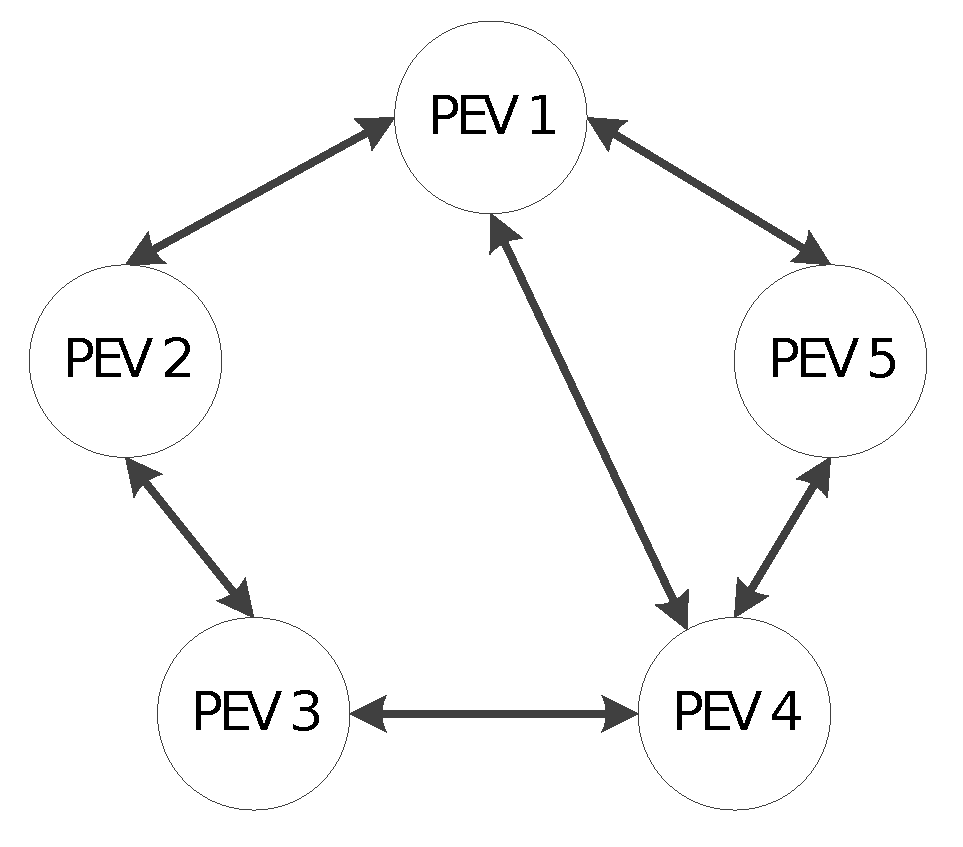
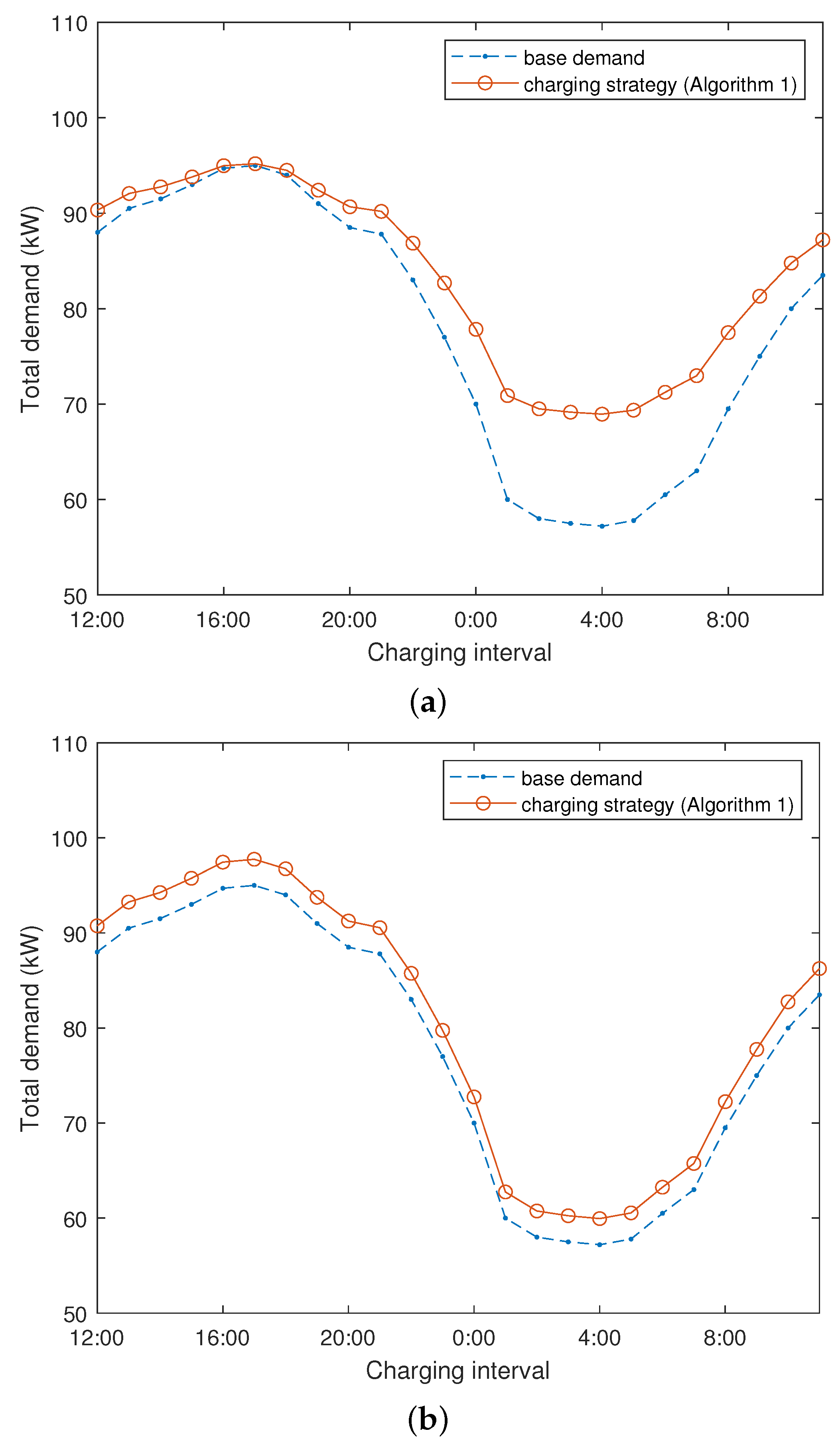
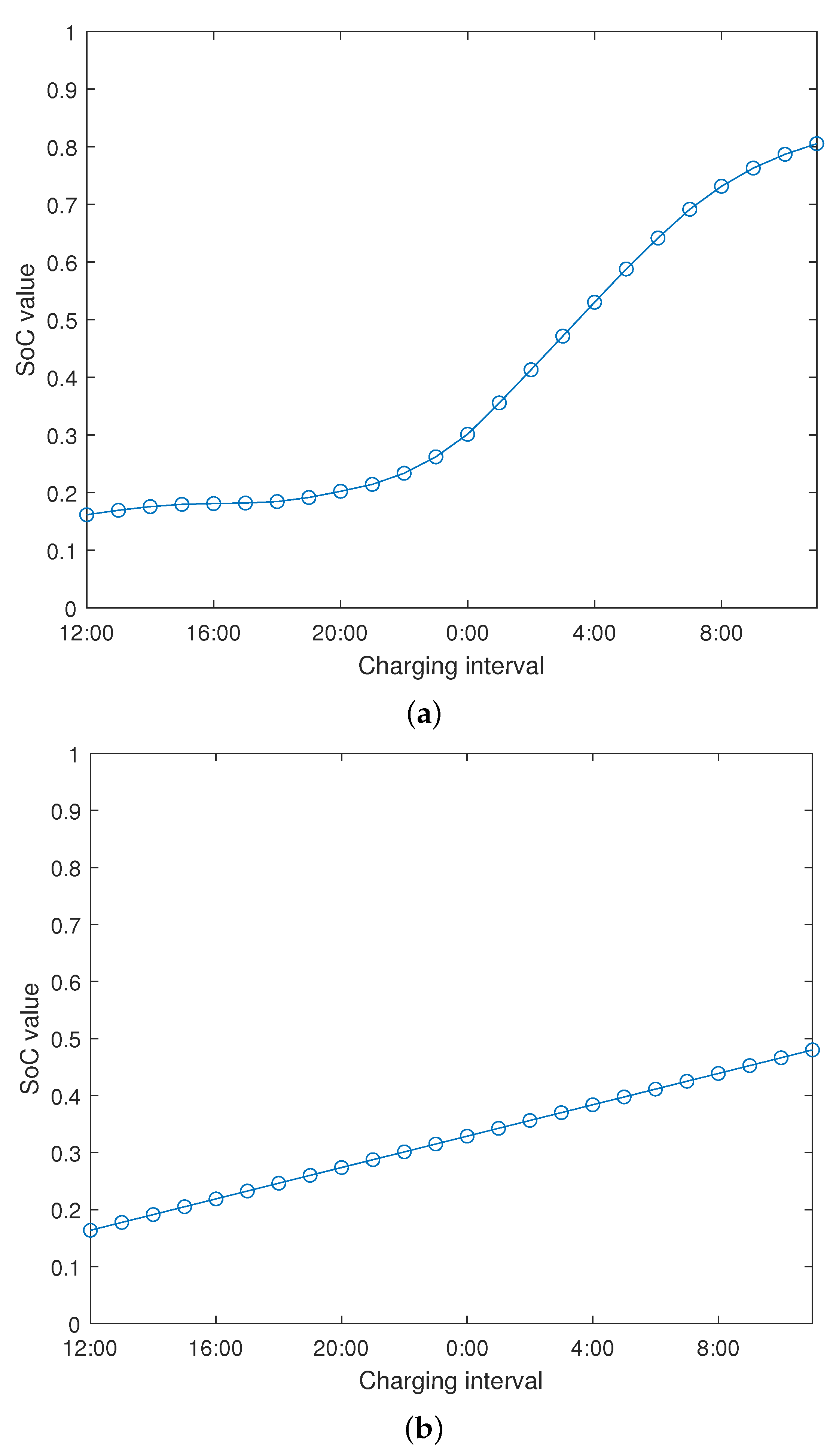

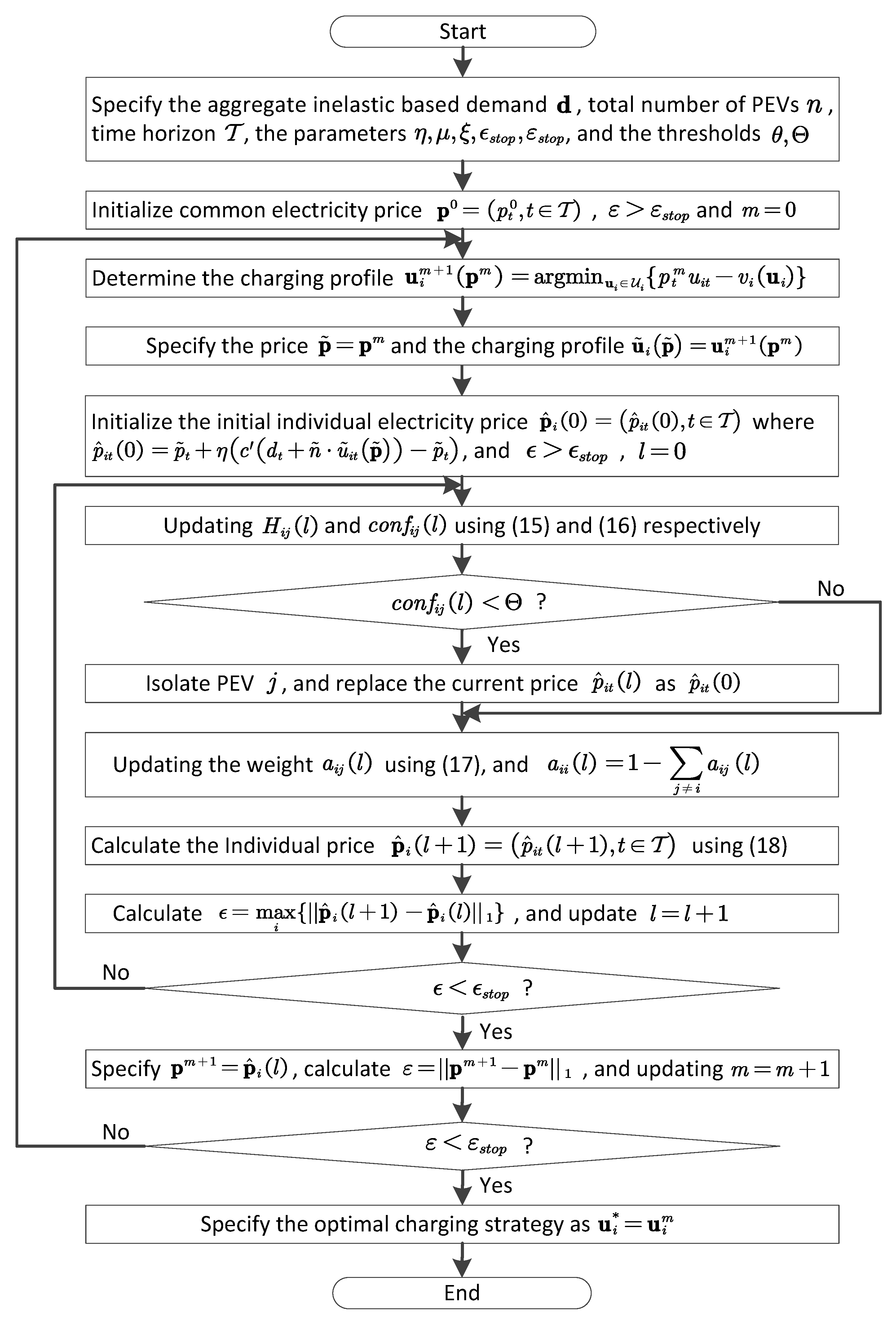
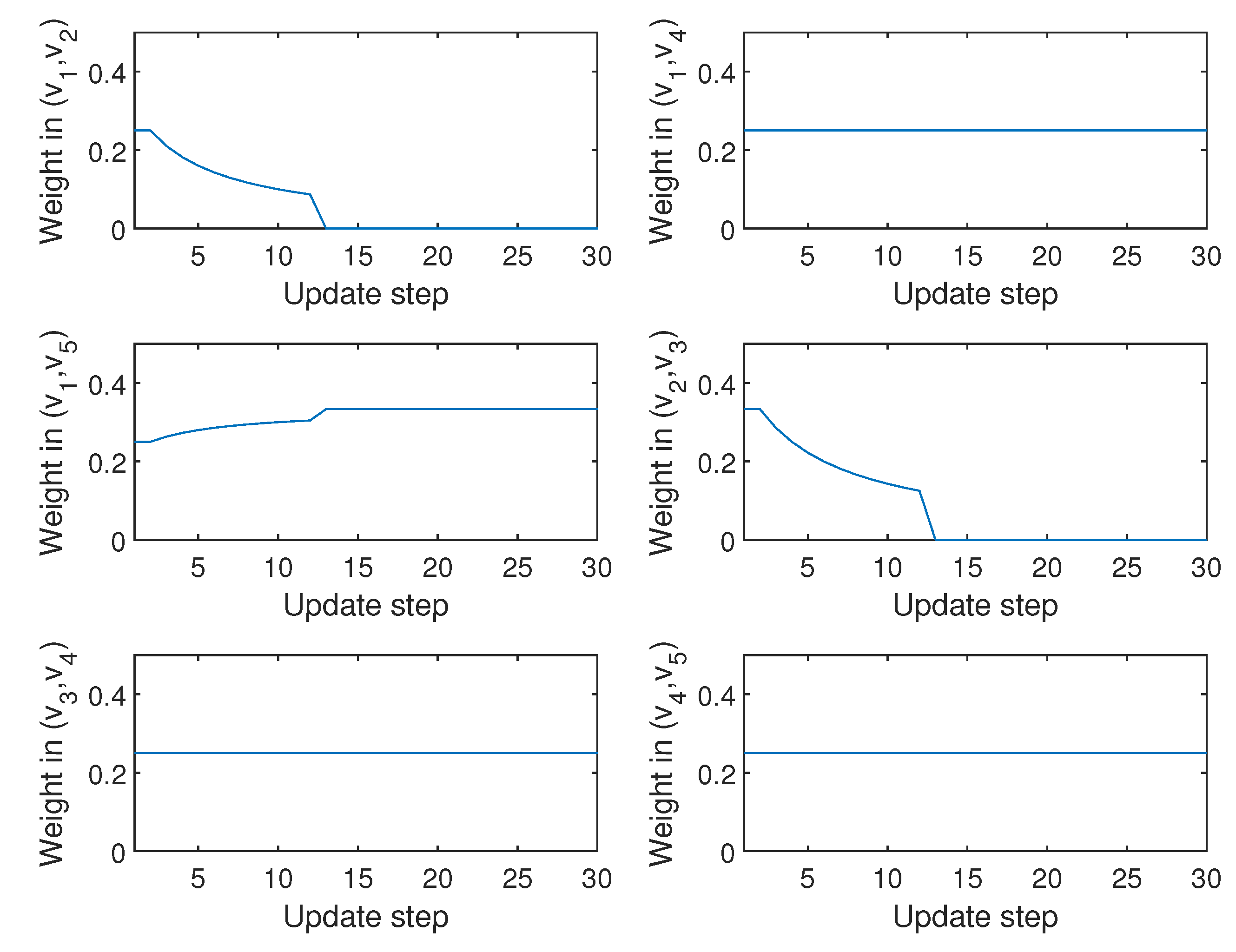
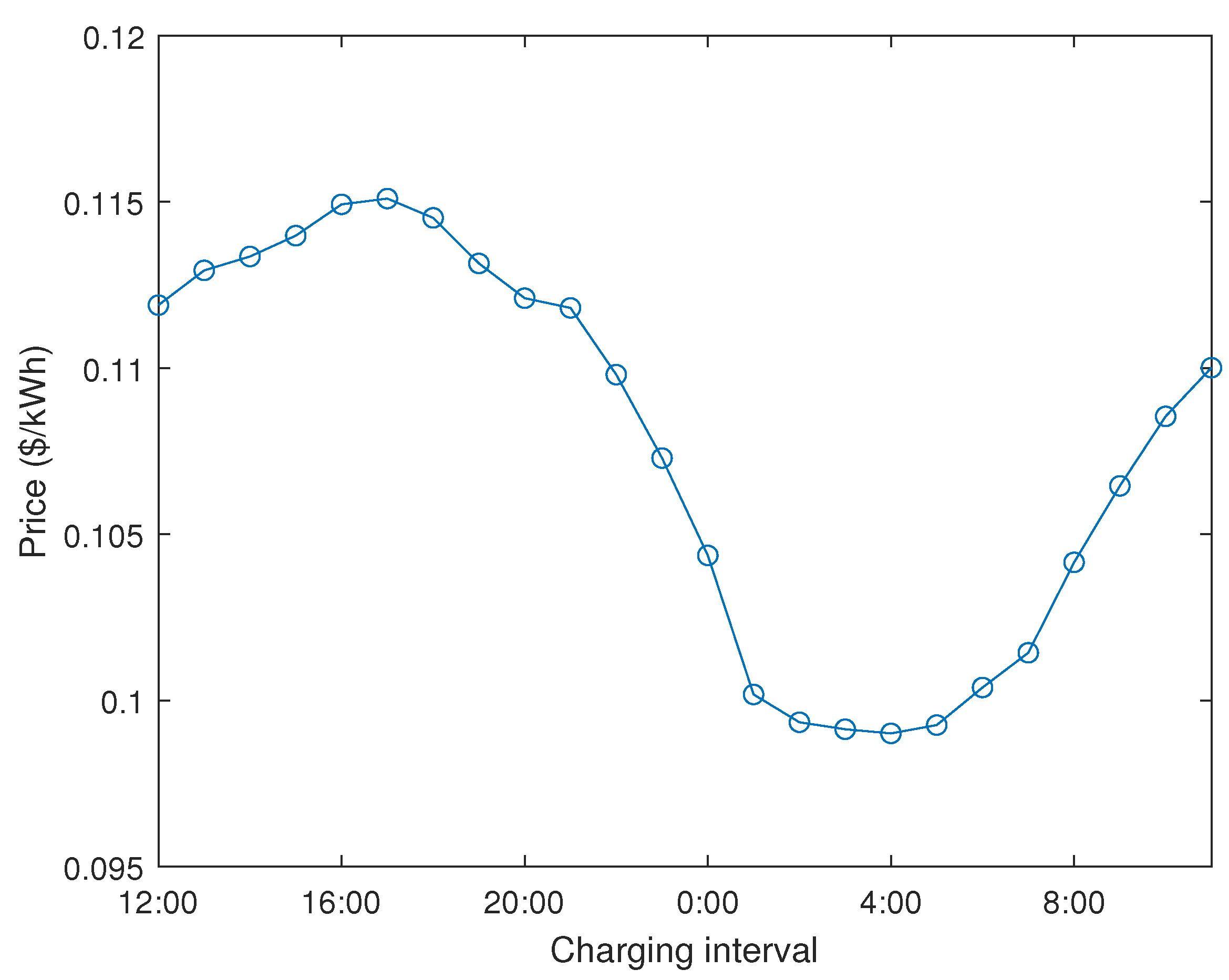
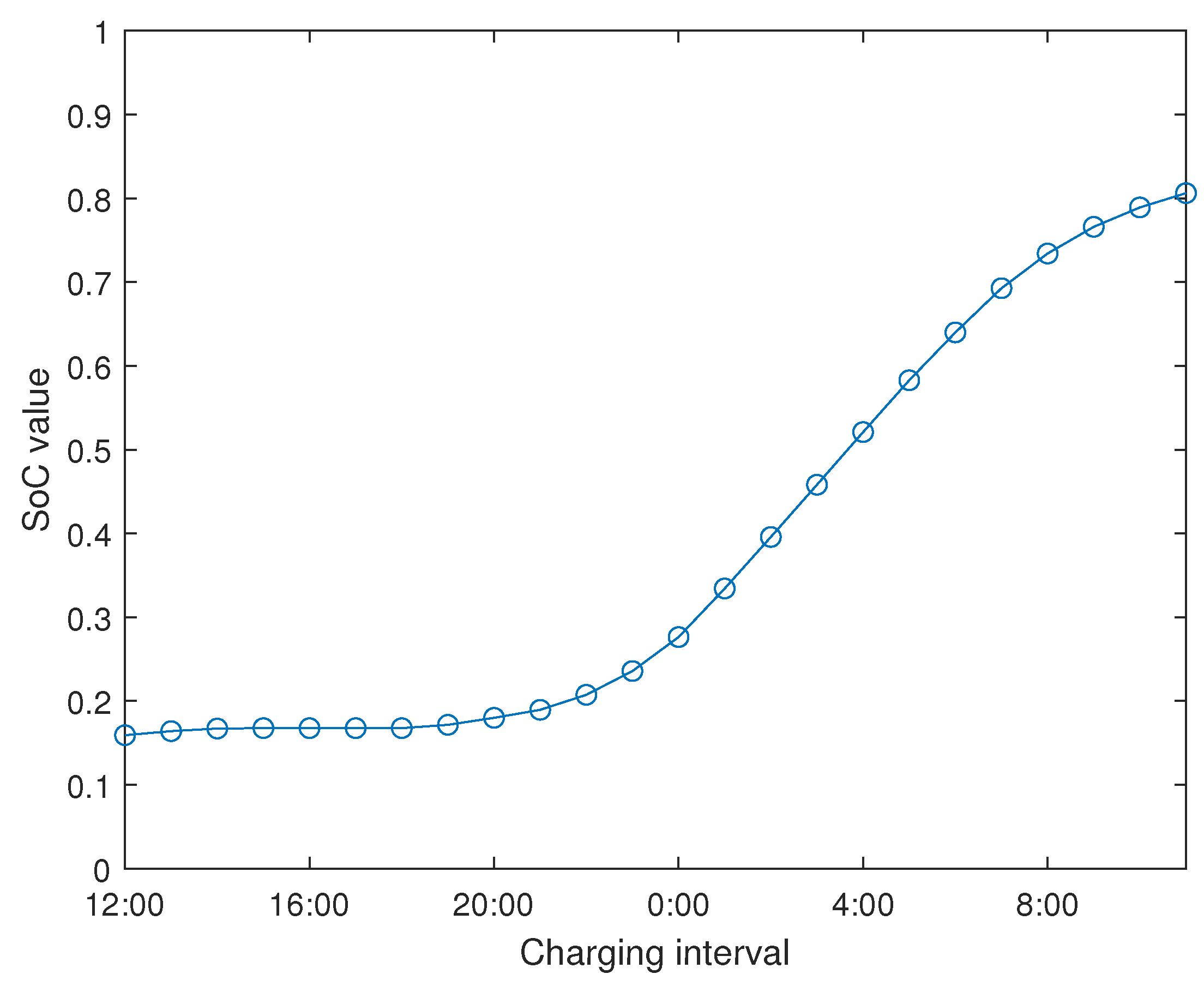
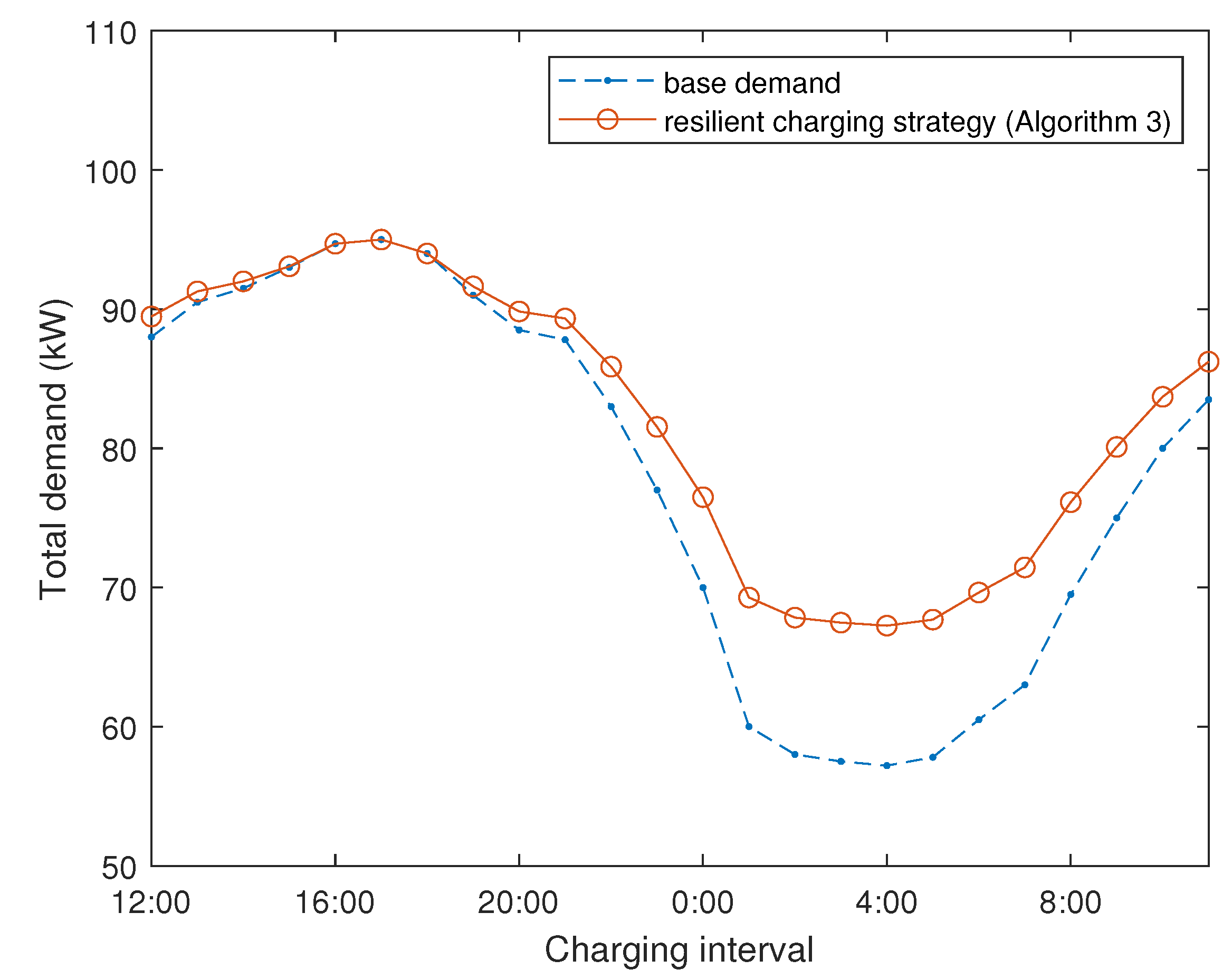
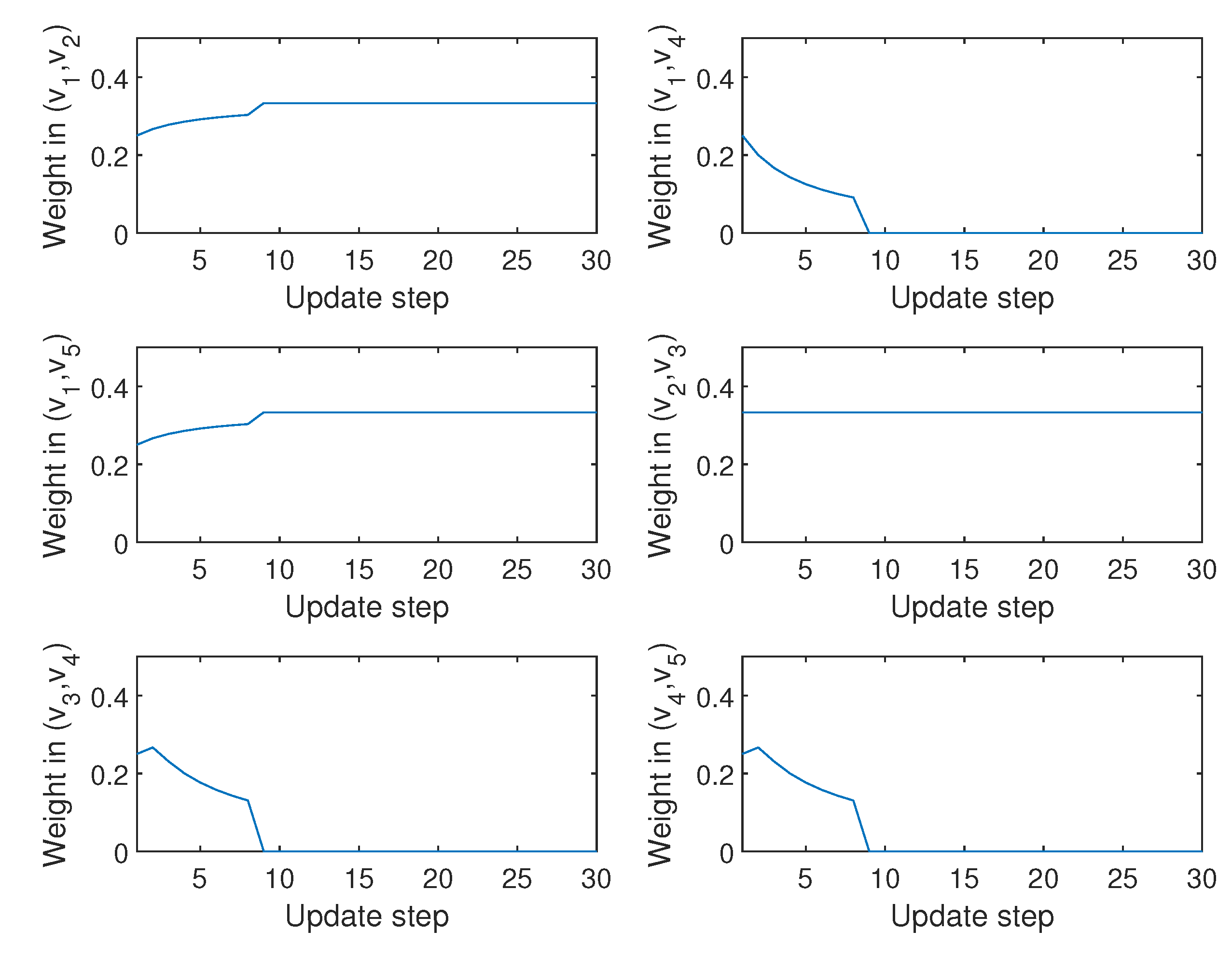
© 2020 by the authors. Licensee MDPI, Basel, Switzerland. This article is an open access article distributed under the terms and conditions of the Creative Commons Attribution (CC BY) license (http://creativecommons.org/licenses/by/4.0/).
Share and Cite
Weng, S.; Li, Y.; Ding, X. Resilient Distributed Coordination of Plug-In Electric Vehicles Charging under Cyber-Attack. Electronics 2020, 9, 770. https://doi.org/10.3390/electronics9050770
Weng S, Li Y, Ding X. Resilient Distributed Coordination of Plug-In Electric Vehicles Charging under Cyber-Attack. Electronics. 2020; 9(5):770. https://doi.org/10.3390/electronics9050770
Chicago/Turabian StyleWeng, Shengxuan, Yanman Li, and Xiaohua Ding. 2020. "Resilient Distributed Coordination of Plug-In Electric Vehicles Charging under Cyber-Attack" Electronics 9, no. 5: 770. https://doi.org/10.3390/electronics9050770
APA StyleWeng, S., Li, Y., & Ding, X. (2020). Resilient Distributed Coordination of Plug-In Electric Vehicles Charging under Cyber-Attack. Electronics, 9(5), 770. https://doi.org/10.3390/electronics9050770




